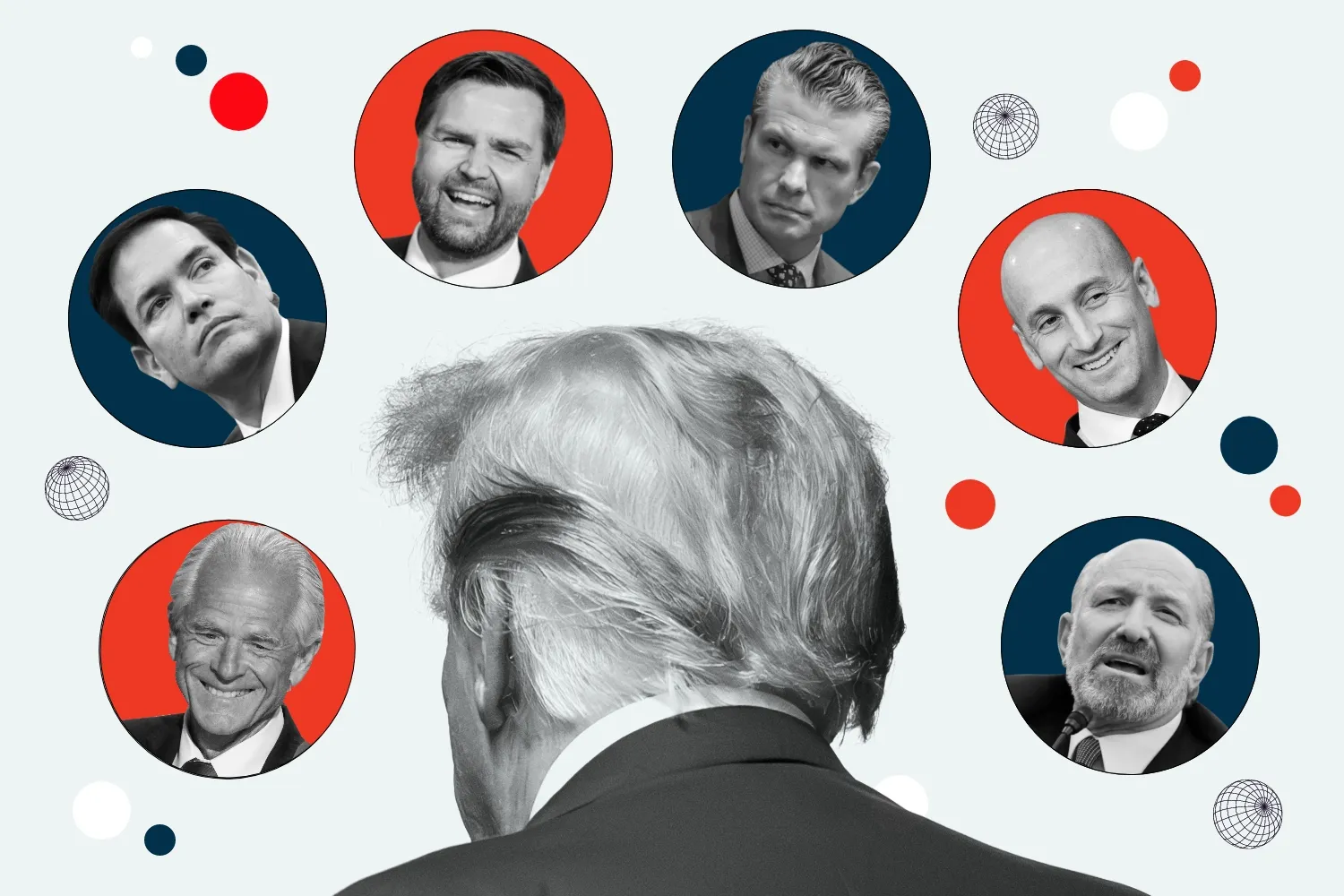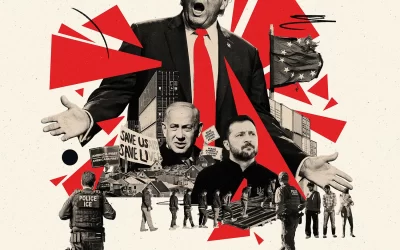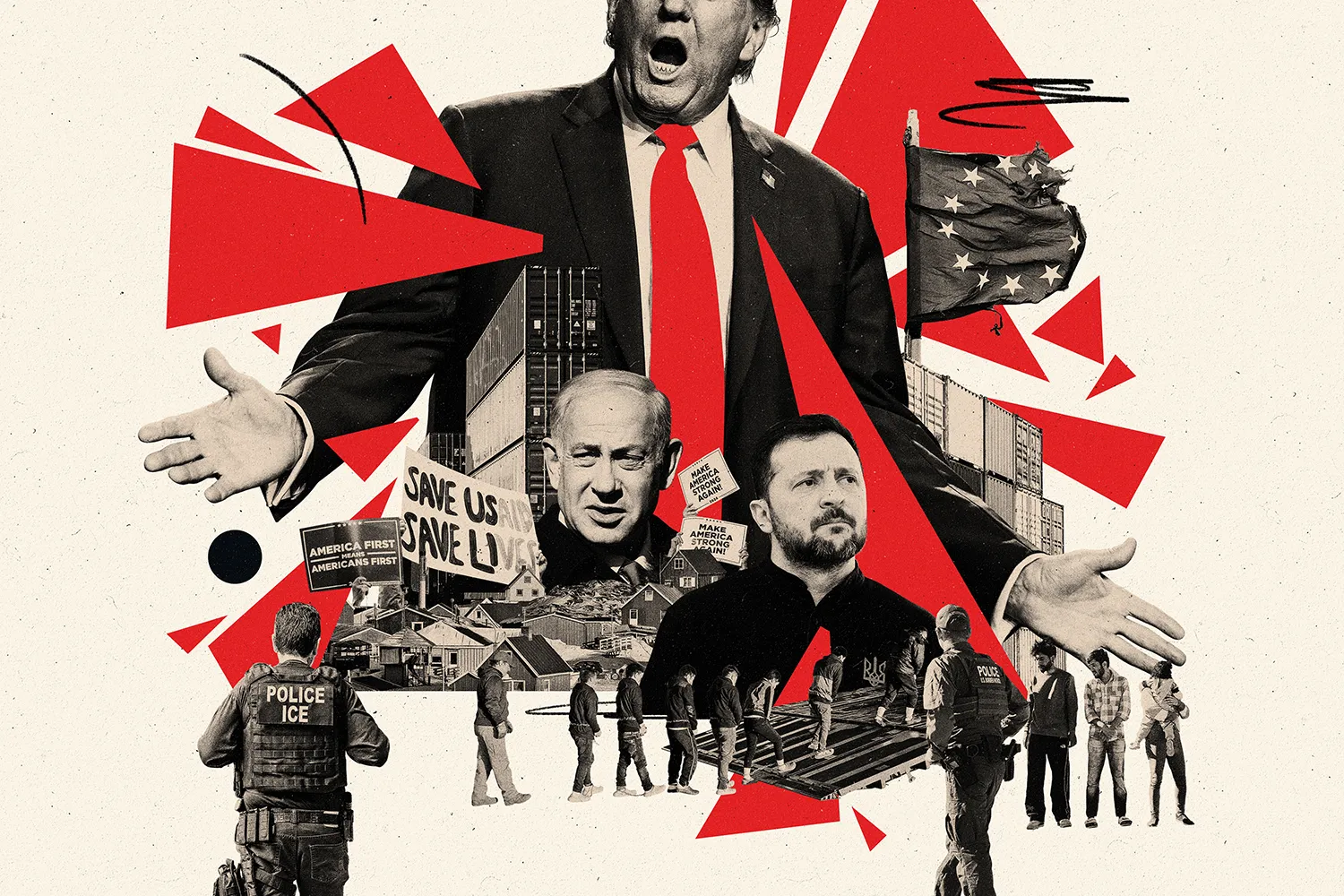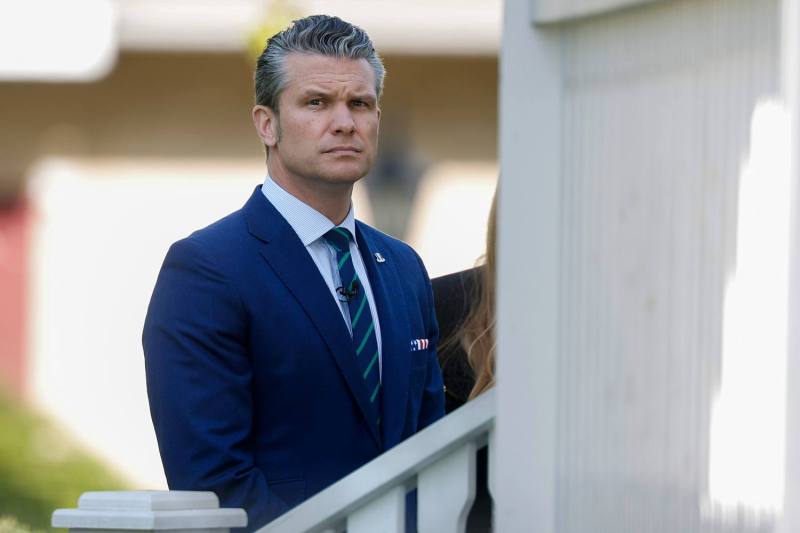The Drivers (and Passengers) of Trump’s Foreign Policy

Analysis
The Drivers (and Passengers) of Trump’s Foreign Policy
Who has been front and center and who has been sidelined in the administration during the U.S. president’s first 100 days.
Even by Donald Trump’s usual standards, his first 100 days as U.S. president have been chaotic, disruptive, and confrontational. That’s especially true on the foreign-policy front, where Trump has pushed for quick (and thus far unfinished) deals to end the wars in Ukraine and Gaza, deported more than 200 immigrants to prisons in El Salvador, and launched a trade war against most of the world (but primarily China).
So far, there has been relatively less churn within his administration’s top ranks compared to his first term in office, and a few key individuals have emerged as the main players shaping and executing his geopolitical priorities. There are also others who appeared set for influential roles in the early weeks of January but have effectively been sidelined.
Even by Donald Trump’s usual standards, his first 100 days as U.S. president have been chaotic, disruptive, and confrontational. That’s especially true on the foreign-policy front, where Trump has pushed for quick (and thus far unfinished) deals to end the wars in Ukraine and Gaza, deported more than 200 immigrants to prisons in El Salvador, and launched a trade war against most of the world (but primarily China).
So far, there has been relatively less churn within his administration’s top ranks compared to his first term in office, and a few key individuals have emerged as the main players shaping and executing his geopolitical priorities. There are also others who appeared set for influential roles in the early weeks of January but have effectively been sidelined.
There’s one name you might expect on this list whom we chose not to include: Elon Musk. The world’s wealthiest man parlayed nine-figure election campaign donations into an influential and near-omnipresent role in Trump’s administration, seeing him participate in phone calls with foreign leaders, hold high-level meetings at the Pentagon and National Security Agency, and even sit down face to face with Indian Prime Minister Narendra Modi.
Yet Musk’s sway over Washington’s global relationships has waned in recent weeks, ceding ground to the more domestic priorities of Musk’s unofficial Department of Government Efficiency (DOGE) and an incessant stream of pro-MAGA posts on his social media platform, X. What’s more, Musk’s role as a “special government employee” has a 130-day timer that runs out in about a month, and Trump and Trumpworld have hinted that he may not stick around after that.
With that said, here’s who we think has Trump’s trust to execute on his priorities—and who doesn’t.
DRIVERS
Peter Navarro
Navarro, Trump’s White House advisor for trade and manufacturing, has been the guiding hand behind the administration’s costly and disastrous trade policy, second only to Trump himself. That is, until his apparent sidelining earlier this month after Trump backed down from the precipice of his all-out trade war on the rest of the world.
Though Navarro (and his invented alter ego, Ron Vara) was present in the first Trump administration and had the same hawkish trade views then, he wasn’t as influential because the first administration was staffed by fairly conventional economic thinkers such as Steven Mnuchin, Gary Cohn, and Wilbur Ross. But his decision in 2022 to defy a congressional subpoena requiring him to testify and provide evidence to the House Jan. 6 committee, for which he eventually served a four-month prison sentence, evidently proved his loyalty enough to secure a job in the second Trump administration.
This time around, Navarro has taken on a much more prominent role—unchecked for the most part by differing counsel inside the administration, though his ideas were soundly rejected by the market. Navarro appeals to Trump by combining a similar profound misunderstanding of how trade works with a love of import duties on American firms as a cure-all for things that don’t necessarily even need fixing.
But as the ramifications of the trade war Navarro worked so hard to effect began to sink in and global equity and especially bond markets reacted viciously, more market-oriented administration officials such as Treasury Secretary Scott Bessent have gained prominence—at least for now. Trump has dialed back the most outrageous of his trade actions and opened the door to bilateral negotiations with scores of countries. An indication of Navarro’s falling influence is that even Musk thinks he is a “moron.”
Scott Bessent
A Wall Street veteran who advised Trump during the campaign before becoming Treasury secretary, Bessent is starkly different from Navarro. Bessent has offered a carefully reasoned analysis of the causes and curses of the current imbalances in the global economy and advocated careful modifications to the out-of-whack global trading system to redress its flaws while preserving its benefits. His influence over the nascent administration has become especially apparent in the wake of the chaotic rollout of the April 2 “Liberation Day” tariffs on nearly the whole world, with historically high and arbitrarily selected tariff rates on friends and foes alike. With Trump’s partial walk-back of most of the tariffs a week later, as well as the shift toward using tariffs as negotiating leverage rather than as ends in themselves, Bessent’s influence has become apparent.
His perch at the preeminent place atop the global financial system and as steward of the U.S. dollar has also given him a greater voice at a time when global markets appeared to question the sanctity of the greenback and even the appeal of the safe-haven investment of U.S. Treasuries.
Bessent also appears to be one of the inspirations behind the administration’s latest efforts to give meaning to its trade policy, an attempt to use bilateral talks with scores of countries in order to sideline China’s economic influence in a way that unilateral U.S. tariffs alone will be unlikely to do.
Steve Witkoff
Witkoff, a real estate mogul and longtime friend of Trump’s, has been the new administration’s lead negotiator on an array of major foreign-policy crises—despite having no prior government or diplomatic experience. Witkoff, whom Trump originally tapped to be special envoy to the Middle East, helped broker a nearly two-month cease-fire between Israel and Hamas even before Trump took office. But he’s been unsuccessful in reestablishing a truce in Gaza since the previous one broke down.
Witkoff has also been the administration’s point man in talks to end the war in Ukraine. His approach to these negotiations has been controversial. Witkoff has echoed the Kremlin’s talking points on the war, enraging Ukrainian President Volodymyr Zelensky while raising serious concerns among U.S. allies and pro-Ukraine lawmakers in Washington. Zelensky recently accused Witkoff of dangerously “disseminating Russian narratives.” The Trump administration’s push to end the war in Ukraine has gained little ground so far, and the president signaled that the United States could soon move on from the negotiations (and even the war itself) amid the lack of progress.
Meanwhile, Trump continues to view Witkoff as an extremely capable dealmaker and keeps adding to his workload and diplomatic portfolio. Witkoff in recent days began spearheading talks on Iran’s nuclear program. The administration wants to secure an agreement that would prevent Iran from developing a nuclear weapon. Witkoff has offered mixed messages on whether the United States wants to see Iran limit or completely dismantle its nuclear program. The talks are in the early stages, but Trump has said the United States and Israel could take military action if a deal is not reached.
Witkoff’s outsized influence in the new administration is indicative of Trump’s unorthodox approach to foreign policy and the president’s tendency to place inexperienced but loyal outsiders in key positions. Democratic Sen. Adam Schiff of California recently told Foreign Policy that he views Witkoff as the “real secretary of state,” stating that Witkoff is “clearly having a far greater role in both the Middle East and Russia” than Secretary of State Marco Rubio.
J.D. Vance
Few Trump officials have inspired legions of memes like Vice President J.D. Vance, who as Trump’s second-in-command was always expected to stick to the script when discussing his boss’s agenda. But Vance has in recent months come to fully embody the administration’s zealous and aggressive foreign policy as he seeks to establish himself as Trump’s loyal attack dog in public fora.
First came the Munich Security Conference in February, when Vance stunned European lawmakers with a highly unusual speech that revealed just how dramatically the second Trump administration is upending trans-Atlantic relations. Vance again positioned himself as chief attack dog during a high-profile White House visit by Zelensky later in February. After mostly sitting quietly for 22 minutes while Trump and Zelensky spoke, Vance butted in aggressively, laying the groundwork for the two U.S. leaders to loudly berate their Ukrainian counterpart in an explosive and public face-off.
More recently, Vance has been the face of some of Trump’s most controversial foreign-policy bids, including by enthusiastically spearheading a trip to Greenland that the island clearly did not want. (Ahead of the trip, representatives from the U.S. government reportedly struggled to find any Greenlanders willing to receive second lady Usha Vance, according to Danish media.) Vance, as expected, only doubled down on the mission.
Stephen Miller
The “Signalgate” scandal that roiled Washington last month wasn’t just a stunning leak for the second Trump administration. It also offered a revealing look into how Trump’s top advisors communicate when their boss isn’t in the room—and who has the final say.
The published group chat messages suggest that power may lie with Stephen Miller. Miller made a name for himself during the first Trump administration as the architect of its highly controversial immigration policies and was known for encouraging the U.S. leader’s more hard-line impulses. He now commands even more influence as Trump’s homeland security advisor and White House deputy chief of staff for policy, particularly with steering the administration’s mass deportations and crusade against America’s top universities.
Miller has used his authority to publicly test the limits of Trump’s presidential power in the administration’s clash with the courts, most recently with the case of Kilmar Abrego Garcia, the Maryland man who was mistakenly deported to an El Salvador prison. The Trump administration claims that Abrego Garcia is a member of the MS-13 gang, an allegation that he denies and has never been criminally charged with. Yet the government has also previously conceded that Abrego Garcia’s deportation was an “administrative error,” and court rulings have required the White House to “facilitate” his return.
Miller has been defiant. He appeared to contradict the court’s findings in an interview with Fox News, in a brazen move that illustrates his influence and could set the stage for a sharper legal showdown. “He was not mistakenly sent to El Salvador,” Miller declared. “This was the right person sent to the right place.”
PASSENGERS
Marco Rubio
For someone whose job description is being the president’s chief advisor on foreign policy and carrying out Washington’s foreign-policy priorities, Rubio has been far from the singular U.S. point person on Ukraine, Gaza, or Iran—often ceding space to Witkoff in particular and being tasked more with damage control than decision-making.
The secretary of state’s most prominent execution of Trump’s priorities thus far has been in revoking the visas of hundreds of college students and having the social media accounts of new applicants monitored.
Rubio has also seemingly been tasked with dismantling much of the department he oversees (reportedly by as much as half)—including the recent closure of an office tracking foreign disinformation, the gutting of the U.S. Agency for International Development (USAID), and the reported paring down of the State Department’s work on human rights—in line with the priorities of DOGE and Musk, with whom he has reportedly clashed. Rubio’s recent firing of MAGA loyalist Peter Marocco, who had been in charge of winding down USAID after it was subsumed by the State Department, set off a firestorm of criticism against the secretary of state by some of Trump’s most ardent supporters and reignited speculation that his days in the cabinet may be numbered.
Perhaps Rubio’s biggest moment so far, at least when it comes to pop culture, was as an extremely uncomfortable-looking witness to Trump and Vance’s combative dressing-down of Zelensky in the Oval Office—a scene so awkward that Saturday Night Live actually parodied it.
Jamieson Greer
Of those who have lost influence, and even the appearance that they know what is going on, are two of the people who should have been front and center of the administration’s biggest single initiative: U.S. Trade Representative (USTR) Jamieson Greer and Commerce Secretary Howard Lutnick, whom Trump initially tapped to run the administration’s trade policy.
Of the two, Greer has been most wrong-footed, most famously when in the middle of testifying on Capitol Hill about why massive tariffs were absolutely necessary even on allies with whom the U.S. has a trade surplus, he discovered that Trump had cut his legs out from under him by announcing on social media an about-face that left Greer fumbling. While the office of the USTR prepared a carefully documented complaint sheet about other countries’ discriminatory trade practices, none of that work went into the arbitrary formula used for the initial “Liberation Day” tariffs.
And while in Trump’s first term, international partners knew that in then-USTR Robert Lighthizer they had a whip-smart, trade-savvy interlocutor with the president’s ear, it is not clear even now what role, if any, Greer actually plays in formulating U.S. trade policy.
Howard Lutnick
Trump had initially envisioned Lutnick, the commerce secretary, as the chief driver of his trade policy, even though Trump himself held firmly to the helm, Greer had the congressionally mandated authority to carry it out, Bessent was arguing for a bigger role for Treasury, and Navarro had the president’s ear.
But since Trump’s trade war has escalated, Lutnick has only underscored in public his lack of influence over the administration’s policy. Markets were already skeptical of his abrasive tone and perceived lack of economic understanding. But he, like Greer, has also been out of step with Trump’s whiplash trade policy. Lutnick repeated loudly and often that tariffs were not about negotiations but were meant to punish unfair practices—until the president declared just the opposite. He promised a future for Americans of “screwing in little screws” to make iPhones—until the president exempted electronics from the punitive China sanctions, undercutting his entire, already-questionable rationale for the China duties. Reports suggest the White House is trying to keep Lutnick off the television.
Keith Kellogg
Retired Lt. Gen. Keith Kellogg, Trump’s special envoy for Ukraine and Russia, has struggled to assert himself in the new administration. He’s often taken a back seat to Witkoff amid U.S. efforts to end the war in Ukraine. Kellogg, for example, was not in attendance for recent cease-fire negotiations in Riyadh, raising questions as to whether he’s been sidelined.
Kellogg, who is known as a Russia hawk and viewed as friendlier to Kyiv than other administration officials, did attend more recent talks on the war in Paris. But it’s clear that Trump has placed far greater trust in Witkoff to handle this issue, as evidenced by the real estate mogul’s repeated trips to Russia. And with the president signaling that the U.S. could soon abandon efforts to end the war, Kellogg could potentially fade even further into the background.
Pete Hegseth
Hegseth’s tenure as Pentagon chief has been typified by chaos and controversy. Just weeks after barely being confirmed in the Senate, Hegseth in February rattled U.S. allies with a divisive speech at a NATO meeting in Belgium in which he said Washington would no longer “tolerate an imbalanced relationship” with allies and ruled out Ukraine joining the alliance. Hegseth also said a return to Ukraine’s pre-2014 borders was “unrealistic.”
The former Fox News host, whom Democrats view as historically unqualified to be defense secretary, was subsequently accused by critics of effectively throwing away Kyiv’s most important leverage in any peace negotiations with Moscow. Republican Sen. Roger Wicker of Mississippi, chairman of the Senate Armed Services Committee, said that Hegseth made a “rookie mistake” with his speech.
Hegseth is also at the center of one of the biggest controversies the Trump administration has faced so far: Signalgate. He shared sensitive information on coming U.S. military strikes against the Houthis in Yemen in a Signal group chat with other top administration officials, which accidentally included the editor in chief of the Atlantic.
In early April, the Pentagon’s acting inspector general launched an inquiry into Hegseth’s role in the Signal group chat. Though the Trump administration has maintained that no classified information was shared in the chat, reports suggest otherwise and national security experts have essentially said such assertions are bogus, while expressing concerns that this scandal will seriously affect intelligence sharing with key allies—potentially making it harder to protect the country from threats.
And just this week, the New York Times reported yet more allegations that Hegseth shared sensitive military information about the Yemen operation on Signal, this time in a group chat that included his wife, brother, and personal lawyer.
This post is part of FP’s ongoing coverage of the Trump administration. Follow along here.
More from Foreign Policy
-

An illustration shows a line of large shopping carts facing down a small Donald Trump figure holding two shopping bags. The stars of China’s flag are in the upper left corner. Why Beijing Thinks It Can Beat Trump
China’s elites have a new confidence in their own system.
-

U.S. Army Chief of Staff Randy George speaks to U.S. soldiers at the Hohenfels Training Area in southern Germany on Feb. 6. A Drawdown of U.S. Forces in Europe Is All but Certain
Here’s how the Pentagon can rebalance its approach to the continent without sacrificing U.S. interests.
-

University of California, Los Angeles students, researchers, and demonstrators rally during a “Kill the Cuts” protest against the Trump administration’s funding cuts on research, health, and higher education in Los Angeles on April 8. Why Authoritarians Attack Universities First
A Yale professor and expert on fascism talks about why he’s leaving the United States under Trump.
-

Dwight D. Eisenhower looks over a piece of paper while sitting on a couch as Robert Cutler looks over his shoulder. How Generations of Experts Built U.S. Power
And now Trump is throwing it all away.



























Join the Conversation
Commenting on this and other recent articles is just one benefit of a Foreign Policy subscription.
Already a subscriber?
.
Subscribe
Subscribe
View Comments
Join the Conversation
Join the conversation on this and other recent Foreign Policy articles when you subscribe now.
Subscribe
Subscribe
Not your account?
View Comments
Join the Conversation
Please follow our comment guidelines, stay on topic, and be civil, courteous, and respectful of others’ beliefs.
Change your username |
Log out
Change your username:
CANCEL
Confirm your username to get started.
The default username below has been generated using the first name and last initial on your FP subscriber account. Usernames may be updated at any time and must not contain inappropriate or offensive language.